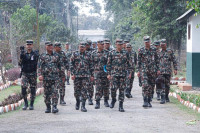National
Key appointments, workload initial challenges for new chief justice
Bishowambhar Prasad Shrestha will helm the judiciary for 14 months until October 4, 2024.
Binod Ghimire
Bishowambhar Prasad Shrestha took charge as the chief justice of the Supreme Court after receiving the oath of office and secrecy from President Ramchandra Paudel on Tuesday.
Shrestha leads the judiciary at a time when more than a quarter of judges positions in all three tiers of the court system are vacant, the courts are overloaded with cases and the very credibility of the judiciary is being questioned.
Except for the nearly two-month long tenure of former chief justice Hari Krishna Karki, the Supreme Court has been led by acting chief justices ever since the suspension of Cholendra Shumsher Rana, then chief of the judiciary, on February 13 last year when an impeachment motion was brought against him in Parliament.
Lack of full-fledged leadership left the entire judiciary in transition for nearly a year and a half. Deepak Kumar Karki, who succeeded Rana, retired as acting chief justice. Hari Krishna also worked in the capacity of acting chief justice for most of his nine-month tenure.
Shrestha, who is regarded as one of the fair and competent justices, will helm the judiciary for 14 months until he reaches the mandatory retirement age of 65 on October 4 next year.
“He hasn’t courted controversy for his rulings and is enriched with a long experience in the judiciary,” Balaram KC, a former Supreme Court justice, told the Post. “He has an opportunity to boost the credibility of the judiciary and he is capable of doing so.”
Born on October 6, 1959 in Doti, Shrestha joined the judicial service as a section officer on April 9, 1982 and became a Supreme Court justice on August 1, 2016. He has 31 years of experience in the judiciary. KC said Shrestha’s test will begin with how he appoints justices and judges.
Seven among the 21 posts of justices in the apex court remain vacant. The high courts and district courts too are reeling under a severe shortage of judges. As many as 53 judges positions in high courts and 38 in district courts remain vacant. Six among the seven high courts have been without chief judges for months.
The chief justice-led five member Judicial Council has the authority to appoint judges and justices. KC said Shrestha must play an assertive role in the council to ensure merit-based appointments.
“He has the constitutional authority to play a dominant role in the council,” he said. “He must resist unnecessary political pressures in the appointments. If he cannot stop political intervention in the appointments, the judiciary’s credibility will continue to be questioned.”
KC added, only lawyers who are highly regarded, have pleaded a good volume of cases, and have paid a decent amount of tax to the state, should qualify for appointment as justices and judges.
Power-sharing in judicial appointments has been the norm of late; Shrestha will be the last career justice to lead the judiciary this decade.
“Improvement in the clearance rate of cases and decreasing the courts’ workload should be the top priority of the new chief justice,” Gopal Krishna Ghimire, president of Nepal Bar Association, told the Post.
As per the annual report of the judiciary submitted to the President last month, the Supreme Court could clear only 20.90 percent of the cases in the fiscal year 2021-2022. Of the 38,730 cases in the court’s docket in the fiscal year including 10,953 newly registered ones, it could clear only 8,096. It left a backlog of 30,634 cases for another fiscal year. A total of 4,858 cases are older than five years.
The situation was no different in the fiscal year 2020-2021. Of the total 33,466 cases including the backlog, the court could clear just 5,689 cases that year.
Failure of the Judicial Council to appoint judges in high courts has hindered their performance. The high courts could clear 60.56 percent of the cases in the fiscal year 2021-2022, leaving 26,998 cases pending. The district courts have 107,130 pending cases, even with a 63.45 percent clearance rate.
Ghimire said the implementation of the judicial reforms as recommended by the then justice Hari Krishna Karki-led committee in July 2021 should also be among Shrestha’s priorities.
The Supreme Court has adopted a lottery system of case management, but has failed to introduce an automated system, as the report suggests. The report has made several other recommendations.
Amid the failure of the Constitutional Bench to work efficiently, former justice KC said Shrestha must ask for a separate Constitutional Court.
“In the parliamentary hearing, Shrestha said that he would form a team to clear older cases, but that is not the solution,” KC said. “The only way to cut the Supreme Court’s heavy workload would be through the establishment of a separate Constitutional Court. He must dare to make a demand for such a court.”
KC added that constitutional courts have performed brilliantly in South Africa and other Western countries. “We have to learn from them,” he said. “Shrestha should also focus on the establishment of specialised courts for handling family, consumer and commercial cases.”




 10.54°C Kathmandu
10.54°C Kathmandu














